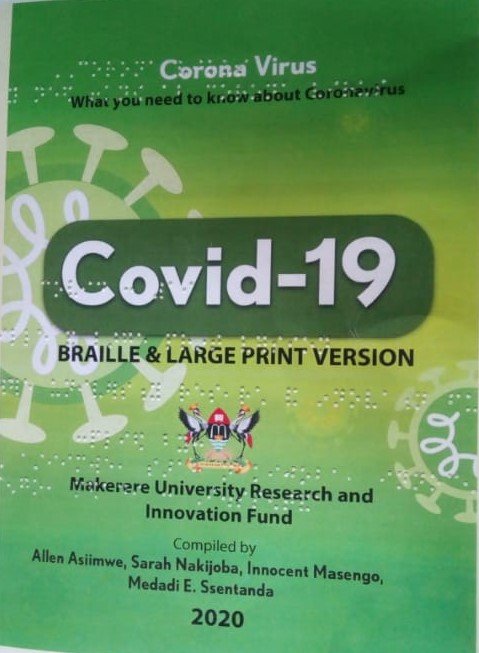A group of Makerere University researchers from departments of African languages and linguistics, English language studies and communication skills have developed Covid-19 related messages and transcribed it into braille for persons with visual impairment.
The researchers include; Dr. Allen Asiimwe the principal investigator from the department of African languages, Dr. Sarah Nakijoba, department of linguistics, English language studies and communication skills, Dr. Nedadi Ssentanda (African languages department) and Innocent Masengo.
They say that a lot of COVID-19 messages have been disseminated to the public using different media and targeting different people, but leaving out persons with visual impairment.
Last year the Government of Uganda gave Makerere University Sh30B for academic staff to research on various issues that propel development in the country.
One of the requirements of this research innovation fund(RIF) is to disseminate the research findings to the general public.
The group has discovered that some marginalized groups in the community have been left out while sending COVID-19 messages especially persons with visual impairment. They have therefore developed messages and transcribed it into braille to help them understand the messages. And therefore, there was a need to transcribe these messages to braille form.
Braille is a tactile writing system used by people who are visually impaired.
While launching over 70 braille books today at Makerere university, Innocent Masengo notes that the braille materials are designed in the way that persons with visual impairment who are unable to read braille can be helped by family members.
“The material is designed with braille and large print versions that a family member can read and explain to the visually impaired person.” He explains.
Dr. Robert Wamala, a committee member of the research innovation fund says that with this initiative, persons with visual impairment will be able to receive the messages.
“You will all agree with me that it is very important for us to communicate all the Covid-19 messages in a multilingual context so that we can effectively deliver these messages for the good of all of us,” Dr. Wamala explains.
Dr. Allen Asiimwe explains that ever since the Covid-19 was reported in Uganda in march, the MOH and the government have intensified communicating in English, transmitted through channels with limited coverage like TV and radio.
Dr. Asiimwe notes that the project found out that many Ugandans are uninformed or less informed. Therefore, a need to access Covid-19 information in familiar languages.
The message has also been interpreted to languages like Luganda, Runyankore, Rugbara, Kiswahili etc., to help more Ugandans understand the message in local languages, and they started with 40 copies of books for each language.
In Uganda, an estimated 30,000 people lose their sight annually, yet the Uganda National population and Housing Census 2014 shows that already, more than 2.1 million people are living with visual impairment and 250,000 are totally blind.








